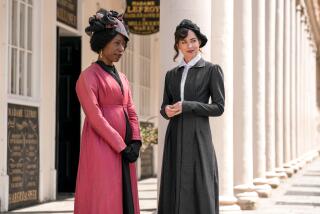âCranfordâsâ turbulent idyll
Itâs been a good run on âMasterpiece Classic,â which began in January with the start of a complete Jane Austen and ends this month with the three-part âCranford,â so itâs only fitting for the series to go out with a bang. Or if not a bang, than a suitably stoic and subtle celebration of the tensions between passions and propriety, tradition and ambition that make 19th century Britain so fascinating to all us modern folk.
Adapted from the works of Elizabeth Gaskell, âCranfordâ is the tale of a village so pastoral it fairly shimmers with verdant hills and bee-loud glades, peopled by doyennes so full of life and character they are played by the likes of Judi Dench, Imelda Staunton and Eileen Atkins. Who are just as marvelous as you would expect them to be, which is pretty darn marvelous.
In other words, âCranfordâ is an Anglophileâs dream date, with hollyhocks and tea sets to spare, the bonus of Julia Sawalha from âAbsolutely Fabulousâ playing an almost-spinster, and all the romance, betrayal and tragic misunderstanding village life can muster.
But itâs also something deeper, and perhaps darker: a paean to a way of life that, for better and worse, is gone. Gaskell was a contemporary of Charles Dickens, and we see in her work some of the same themes Dickens explored -- the blind tyranny of the aristocracy, the importance of universal education, a call to recognize the humanity of the poor, and the need for society to serve its individuals rather than the other way around. None of which is close to being out of date.
We meet our cast of characters in 1842 and find them living in âelegant economy,â desperately clinging to the old ways even as the modern age, most noticeably in the shape of the railroad, stands banging at the gates.
Miss Deborah Jenkyns is the local arbiter of propriety, and Atkins imbues her with a flinty compassion that will be immediately recognizable to anyone fortunate enough to have a Yankee grandmother. Her sister Matty (Dench) is the softer, more fluttery heart of the group that surrounds Miss Deborah, which includes the gossipy and hilarious Miss Pole (Staunton); the bovine-loving widow, Mrs. Forester (Julia McKenzie); and Mary Smith (Lisa Dillon), a young cousin Matty and Miss Deborah have recently taken in.
Also newly arrived in Cranford is young Dr. Harrison (Simon Woods), whose new ideas of medicine -- badly broken arms can be set and not necessarily amputated -- are as unsettling as his boyish good looks, as well as Capt. Brown (Jim Carter) and his daughters. The captain immediately sets himself up as Miss Deborahâs bete noire by publicly and unapologetically admitting his poverty and declaring that he enjoys âThe Pickwick Papersâ far more than her beloved Dr. Johnson.
Many of the events and issues facing the denizens of Cranford would not be out of place in Austen -- Mary chafes under her stepmotherâs insistence that she marry, soon and whomever; Dr. Harrison sets his cap for the vicarâs pretty daughter, and Papa is not well pleased; one of Capt. Brownâs daughters is terminally ill, and the other, Jessie (Sawalha), has sacrificed a suitor to care for her.
But âCranfordâ also moves beyond the domestic sphere. Through the petty, and necessary, thieving of young Harry Gregson (Alex Etel) we see the inhumanity of Miss Deborahâs faith in the class system. When Harry comes to the indignant attention of Mr. Carter (Philip Glenister), who works for the local aristocracy, Lady Ludlow, we find that not everyone in Cranford believes that the poor should be kept ignorant and therefore poor.
And for all its frills and teacups âCranfordâ does not shy from the grim realities of life in Victorian England -- a manâs life is threatened because the doctor does not have enough candles by which to operate; little coughs give way to fatal fevers; and women, of course, are at the financial mercy of their inheritance or marriage.
Though beautifully adapted as by Sue Birtwistle and Susie Conklin and gorgeously shot by Ben Smithard, âCranfordâ is, in the end, a showcase for some of the Britainâs best actors.
Atkins and Dench are the very definition of elegant economy, creating breathtakingly full-blown characters in a matter of moments -- watching the two sisters contemplate and then commit the act of eating an orange, this viewer had to wonder what wonderful act of charity she had inadvertently performed to deserve such a thing. Staunton too is always a treasure, and here she provides pointed, and occasionally soulful, comic relief. Michael Gambon makes an appearance, as does Greg Wise; in fact, so much talent fills the screen that the only real problem with âCranfordâ is that, after three episodes, it ends.
--
--
âMasterpiece Classic - Cranfordâ
Where: KCET
When: 9 to 11 p.m. Sunday; Part 1 of 3
Rating: TV-PG (may be unsuit- able for young children)
More to Read
The complete guide to home viewing
Get Screen Gab for everything about the TV shows and streaming movies everyoneâs talking about.
You may occasionally receive promotional content from the Los Angeles Times.







